LRZ-Newsletter Nr. 10/2019 of 05.10.2019

Please find the German Version of the newsletter here.
Our Topics:
News
Secure and Service Oriented
«The I/SMS certification was certainly a difficult project, but we were able to get things moving in the LRZ», says Natalie Vogel. «The certification process has been hugely successful.» For 18 months, Vogel, the responsible person for service management at the Leibniz Supercomputing Centre (short: LRZ), together with Eda Seval, Head of the LRZ Servicedesk, and Stefan Metzger, Chief Information Security Officer, prepared the internal audits and the audit of the certification company DEKRA. The trio prepared the documentation on processes with different teams and departments, initiated inevitable changes and organised the necessary training courses for colleagues. Above all, however, the team explained the steps of the I/SMS project, the certifications, in almost 20 in-house town-hall meetings, ten newsletters and almost 30 weekly huddles and informed about the current state of affairs: «A transparent communication was important to us», says Metzger. «At the beginning of the projct we didn't inform enough about it, some employees felt ignored and had big doubts about the certification.
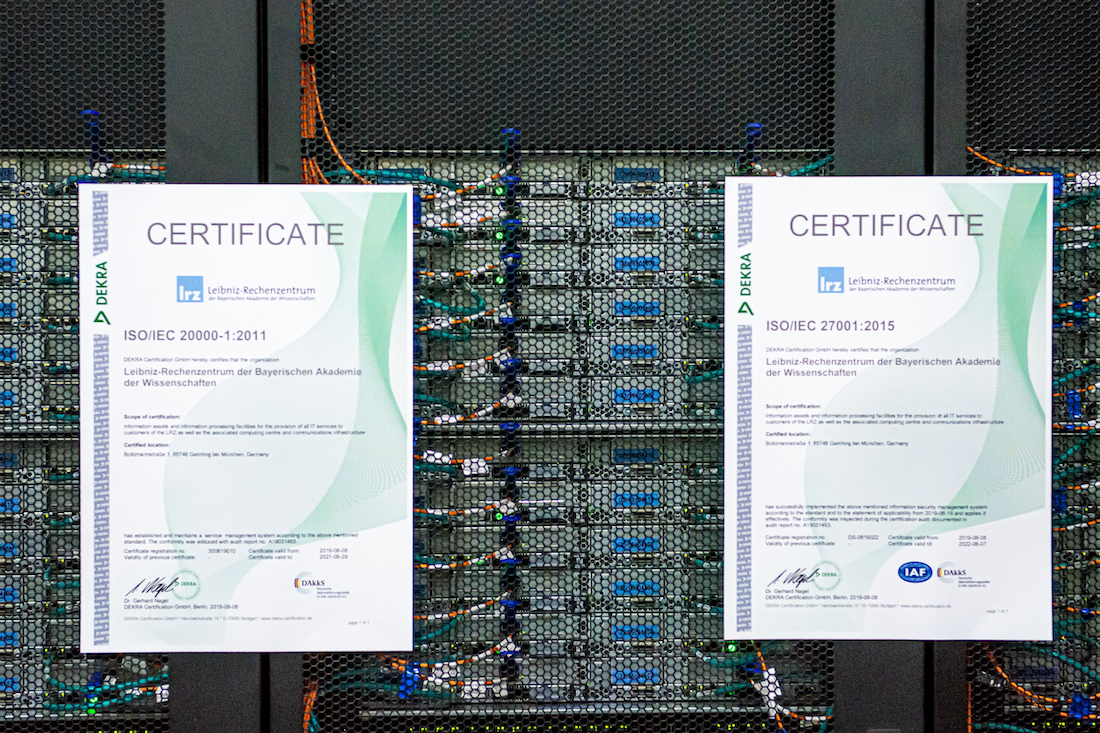
Certification in teamwork
But now the LRZ has it in writing: its IT services are processed efficiently and in transparent processes. Bavaria's leading compute centre has now been awarded the ISO/IEC 20000 certificate for IT service management and the ISO/IEC 27001 certificate for information security by DEKRA. «The LRZ has established a very structured and broadly documented information security and service management system for initial certification», states Jochen Hehn, lead auditor and sales manager at the certification company. The auditors particularly emphasized the successful teamwork, the good planning of the necessary measures for management quality and (data) security in the departments and, above all, the information and transparency: «This shows that the LRZ regards the certification as an opportunity for change and sustainable improvements», explains Heinz Krippel, Managing Director at the consulting and training company mITSM, which coached the LRZ throughout the certification process. «Here, a very committed team has transparently established and implemented the standards.»
ISO/IEC 20000 + ISO/IEC 27001
The project was launched at the end of 2017: In eight subprojects, in addition to the four departmental and two staff positions, 20 to 25 colleagues were usually involved in documenting the processes of their working groups and, if necessary, changing them according to the auditors' recommendations. «In the past, not everyone always knew what to do. The documentation structured processes better and made them more transparent», observes Seval. «The standards are not set in stone, but it helps to systematize management processes. How our processes become safer and better is up to us.»
The LRZ invested around 150,000 euros in certification, external support and employee training. This effort has paid off: The LRZ is thus the first of the German and European scientific high performance computing centres to be awarded these two important certificates: «In such an information-driven area as science and research, security, in particular the confidentiality, integrity and availability of sensitive data, are of paramount importance», says Professor Dr. Dieter Kranzlmüller, Director of the LRZ, explaining the measures. «With the ISO/IEC certifications, we are sending a strong signal to the users of our services, our partners and our employees.»
Starting signal for changes to come
After this initial certification, the LRZ will be regularly reviewed in the coming years so that the two ISO/IEC certificates 20000 and 27001 are renewed every three years. «The LRZ has already become even more professional with the initial certification, and we are now continuing this process», plans Professor Dr. Helmut Reiser, Deputy Director of the LRZ. «Above all, the certification offers opportunities to optimize an organization and its processes, to work on customer relationships and to develop new, secure services. Natalie Vogel, Eda Seval and Stefan Metzger are already working on the next project: «The documentation of the Customer Relationship Management showed possibilities for how and where the LRZ can improve services and communicate more efficiently with its customers and partners. «If we understand more quickly what researchers, students and other partners need, we can develop better new services», Natalie Vogel says. (vs)
Member of the Board of Directors for the Gauß-Allianz
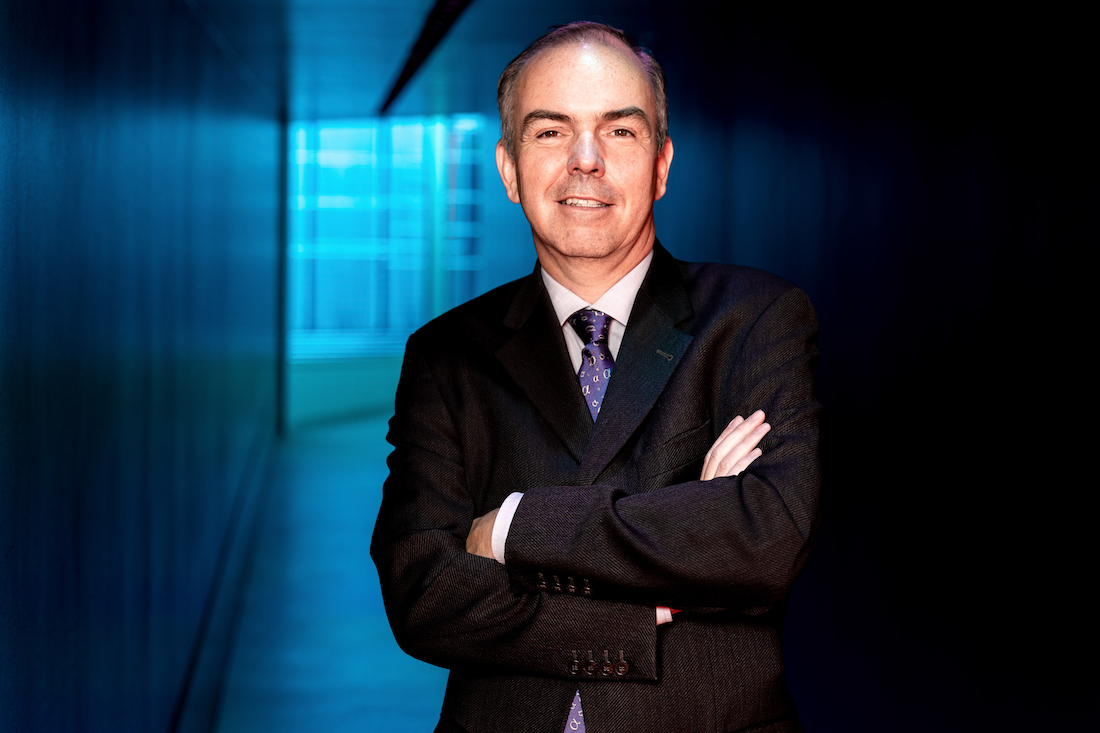
Professor Dr. Dieter Kranzlmüller, Director of the Leibniz Supercomputing Centre (short: LRZ) in Garching near Munich, was appointed to the Board of Directors of the Gauß-Allianz. The Gauß-Allianz is an association based in Berlin and represents 21 scientific high-performance compute centres in Germany. «It makes an important contribution to the future of Germany as an IT location», says Kranzlmüller. «I see my task above all as a link between Tier-1 and Tier-2 high performance compute centres here in Germany. If we better interlink the capacities of all supercomputers in Germany, the innovative power of research and industry can gain more momentum in processing large amounts of data.»
Big Data needs supercomputers
Data volumes are currently growing in all areas of society: High-performance computers, new algorithms and applications are needed in order to evaluate these and develop clear simulations or virtual models. The LRZ operates SuperMUC-NG, currently the fastest and most powerful scientific computer in Germany, and supports researchers in Germany and worldwide in the visualization and processing of big data; the Gauß-Allianz in turn bundles the experience and knowledge from 21 scientific high-performance computing centers and also advises industry and SMEs on a wide range of data and digitalization projects. «Together, we can achieve more and distribute valuable knowledge more widely», adds Kranzlmüller. The director of the LRZ is a full professor at the Chair for Communication Systems and System Programming at Ludwig-Maximilians-Universität, Munich, and currently also the Chair of the Board of Directors for the Gauss Centre for Supercomputing, which unites the three high-performance computer centres of Stuttgart, Jülich and Garching. (vs)
Sensational Images from Space
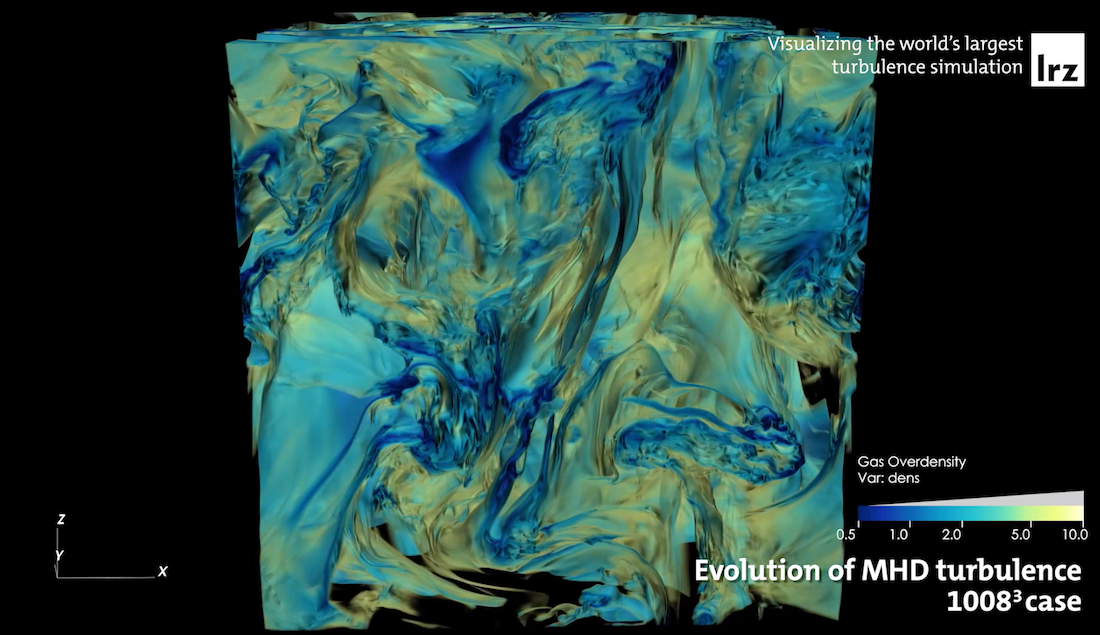
Blue clouds, green clumps embodying gas structures, or a silver-orange mixture representing magnetic fields: these images illustrate the course of interstellar turbulence and are stunning. For the first time, a team of researchers led by astrophysicist Salvatore Cielo from the Leibniz Supercomputing Centre (short LRZ) succeeded in illustrating what happens when the explosions of supernovae and stellar winds form stars. The 3-minute film with the fascinating images and physical formulas is currently being reworked in Garching, but it has already received approval for SC19 in Denver and will be presented there from 17 to 22 November 2019. It is the largest simulation of such a cosmic event ever shown and was produced at the LRZ based on data from the astrophysicist Christoph Federrath of the University of Canberra. The astrophysicists Salvatore Cielo and Luigi Iapichino from the LRZ calculated the rendering at the SuperMUC-NG, which was implemented by the visualization specialists Elisabeth Mayer and Markus Wiedemann. The film visualizes for the first time measurement data from astrophysical turbulences in highest resolution. With huge amounts of data: In addition to the SuperMUC, the open source visualization tools VisIT and OSPRay from Intel were used, which the team adapted to its purposes.
Future technology made in Bavaria
Preparations for the SC19 are already in full swing: The LRZ and its Bavarian supercomputing partners, the Technical University of Munich, the Ludwig-Maximilians-Universität Munich, the Friedrich-August-University and the Regional Compute Centre Erlangen as well as the University of Regensburg will show their research power for the HPC at booth 2063 and also in many lectures, workshops or short discussions. (vs)
Bavaria Counts on LRZ
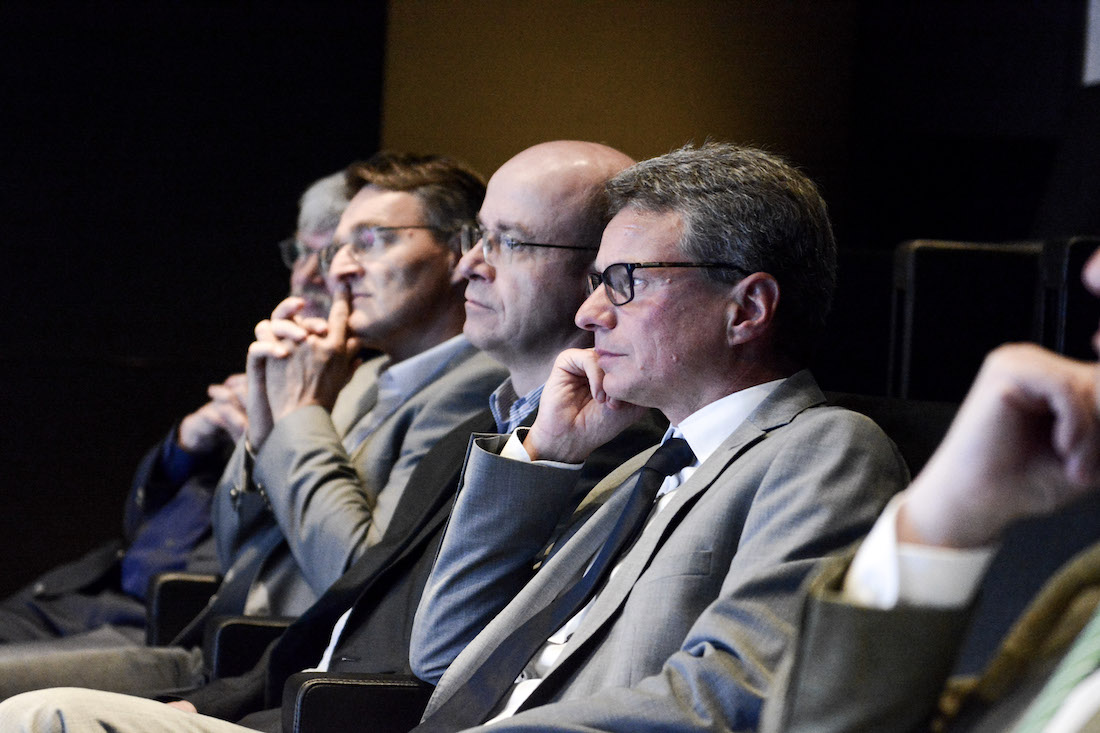
On September 11, Bernd Sibler, Bavaria's Minister of State for Science and Arts, visited the Leibniz Supercomputing Center (LRZ) in Garching: «This is where Bavaria's digital future is being shaped», Sibler said enthusiastically. «The Leibniz Supercomputing Centre is doing pioneering work in the field of AI research and quantum computing technology.» Sibler was shown various simulations and virtual models created on the high-performance computers SuperMUC and SuperMUC-NG in the Center for Virtual Reality and Visualization (V2V). The visitor discussed the challenges of exascale and future computing with Professor Dieter Kranzlmüller, Director of the LRZ, Professor Thomas O. Höllmann, President of the Bavarian Academy of Sciences and Humanities, and other researchers. (vs)
Better Information with Visualisation
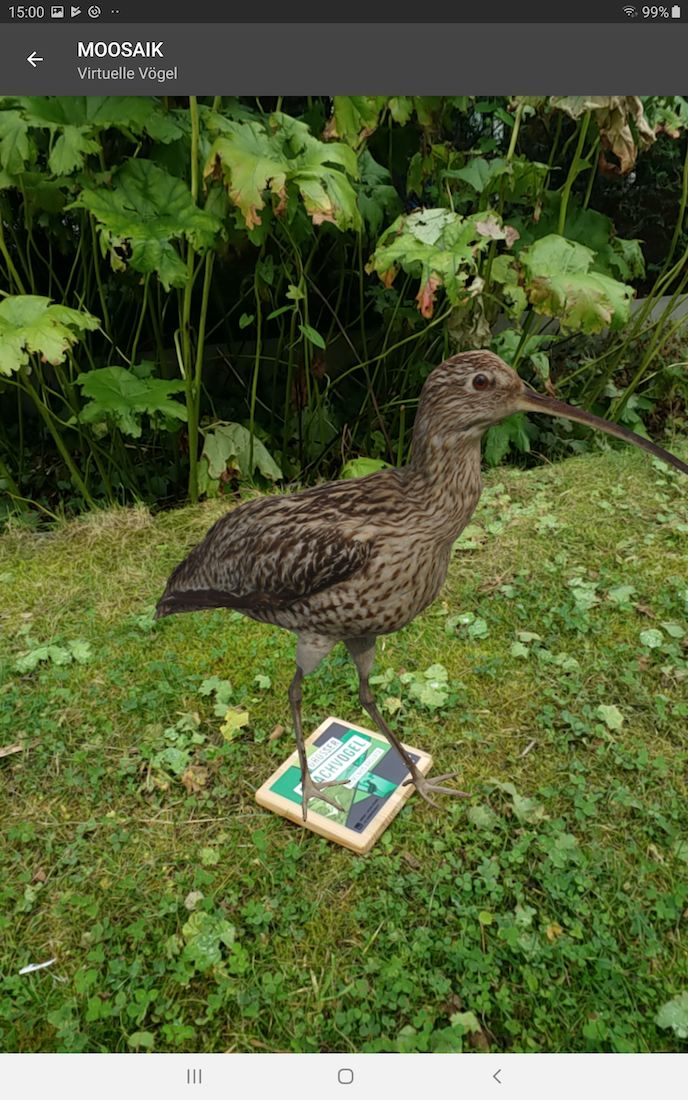
Minister President Markus Söder wants to give Bavaria a "modernisation boost" and explained the state's programm for research and innovation on 10 October: In addition to the universities, future technologies are to be promoted above all. They are already in use at the Leibniz Supercomputing Centre (LRZ), which is why the Centre for Virtual Reality and Visualisation(V2C) was invited to a parliamentary evening in Brussels at the end of September: Lea Weil, specialist for Augmented Reality (AR), and Elisabeth Mayer, expert for Virtual Reality (VR), represented the LRZ and its V2C and presented to the invited politicians, researchers and business representatives how virtualisation and simulations can fuel environmental protection and the understanding of the environment.
Realistic insights into natural phenomena
Weil and Mayer explained their experiences with the help of an app that was developed in cooperation with the Wildland Foundation Bavaria at the LRZ and now consciously guides hikers through the Thalhamer Moos near Mühldorf. The idea is to equip the nature reserve with so-called markers so that the birds living there are not constantly disturbed and visitors can still experience them up close. If you point the camera of a smartphone or tablet at these trackers, you will no longer only see marsh grass and water, but also birds living in them or information about flowers and other plants: The environment is enriched with digital images that are integrated seamlessly into the pictures that devices take in the environment. On a larger scale, three-dimensional simulations and virtual models help people to better imagine natural phenomena or developments in space and medicine. At the parliamentary evening in Brussels, companies such as BMW, CAT Production, 3D Reality Maps and Blue Silver also showed how virtual and augmented reality can be used in business and research today and how they can help with production and planning. (vs)
Workshops & Events
For an Open and Transparent Search Infrastructure
Google or Bing are the most used search engines: But nobody knows how Google or Microsoft select information for queries. The companies guard the algorithms with which websites and other data sources are arranged in the indices of their search engines. As a secret: "A better search on the Internet", the independent Open Search-Foundation has therefore made it its business. Behind this is a network of scientists, computer centres and companies. The aim is to build an open and transparent search infrastructure that is free of commercial interests. The Leibniz Supercomputing Centre(short LRZ) has joined the foundation and will host the international Open Search-Symposium, which will take place on 23 and 24 October: For two days, participants will discuss ideas related to the organization of information and data on the Internet, databases, the future of search engines and their optimization, as well as cloud computing and technology for open, fair and independent Internet search.
Digitalization & Change
"From Digitalization to Digital Transformation" is the title of the lecture that Professor Dr. Thomas Hess will give at the Leibniz Supercomputing Center (short LRZ) on October 17, 2019 from 11 a.m. onwards: Hess will show why the digitalization of organizations and companies is not only a task for classical IT or for the information management. Hess, the head of the Institute for Information Systems and New Media at the Ludwig-Maximilians-Universität Munich, is concerned with the changes in processes and management caused by the use of digital technology and discusses its effects on management and employees. The lecture will be held in English. Registration for participation at <events@lrz.de>.
Performance Portability Programming with Kokkos
Christian R. Trott from Sandia National Lab, USA, will come to LRZ to give an introduction into the Kokkos C++ library on the 24th of October at the LRZ. This library enables applications and domain libraries to achieve performance portability on diverse many-core architectures by unifying abstractions for both fine-grain data parallelism and memory access patterns. Further details can be found at LRZ-website.
Technology Day with Workshops: ANSYS
On the occasion of the new 2019 R3 release of the ANSYS software, the LRZ and CADFEM GmbH, Grafing ,jointly organize an ANSYS Technology Day at the LRZ on November 6, starting at 9:00am. The focus of this ANSYS Technology Day will be set primarily for ANSYS Mechanical. The Technology Day is aimed to provide all users of the ANSYS software for engineering simulations in structural mechanics (CSM), computational fluid dynamics (CFD using CFX, Fluent, Discovery AIM and Discovery Live), electro-magnetic field computation (HFSS, Maxwell-3d) as well as systems simulation a comprehensive update on a selection of new features and modeling. Further details and registration can be found under LRZ-website>.
Molecular Modeling with Schrödinger Suite
The LRZ Staff together with software experts on the Schrödinger Suite will conduct a workshop at the LRZ from Dec. 04 to Dec.05. 2019. The workshop will cover fundamental principles of molecular modeling with an emphasis on molecular dynamics. We will introduce several MD software packages and how to use them on HPC systems and the Remote Visualisation Server of the LRZ. The workshop addresses people with a basic understanding of molecular simulations, e.g. nano-scientists, biologists, physicists or researchers from life-science. The experts will present the Schrödinger software suite, providing a diverse set of tools for modeling and computing the structure and properties of chemical systems, antibodies and proteins. Information and registration on LRZ-website.
Job Opportunities
The following positions are currently open at the LRZ.
You will find a diverse, international team in Garching.
Most job offers are in German – for questions
you will find English speaking colleagues here.
Don't hesitate to e-mail or phone:
- Opencast Experte / Expertin (m/f/d)
- Biomedical HPC Applications and Data Management (m/f/d)
- Training Fachinformatiker/-in Systemintegration (m/f/d)
- Training IT-Systemelektroniker/-in (m/f/d)
- Student Assistants (m/f/d): Datamanagementsystem
- Student Assitant (m/f/d) for Human Resources
- Student Assistant (m/f/d) for Service-Desk
You haven't found anything suitable? We look forward to unsolicited applications.
You will find all current job offers on our website: www.lrz.de/wir/stellen/.
More to Read
Here you will find links to the latest information from the German and European supercomputing community and our cooperation partners:
- Publications of the Gauss Centre for Supercomputing (GCS): Inside & GCSnews
- Infoletters der Gauß-Allianz: September 2019 (PDF: 2 p., 599 KB)
- PRACE: Newsletter
Information about the LRZ Newsletter
- You have problems displaying the newsletter? Please send a short description of your problem to <newsletter-redaktion_AT_lrz.de>. Thank you!
- You can subscribe or unsubscribe the LRZ-Newsletter via our website.
- Previous issues of the LRZ-Newsletter can be found in the archive.
Imprint
- Editor:
- Leibniz Supercomputing Centre of the Bavarian Academy of Sciences and Humanities
- Address:
- Leibniz Supercomputing Centre
Boltzmannstraße 1
D-85748 Garching near Munich - Phone:
- +49-89-35831-8000
- Telefax:
- +49-89-35831-9700
- E-Mail:
- lrzpost_AT_lrz.de
- Editorial Office:
- PR-Team
